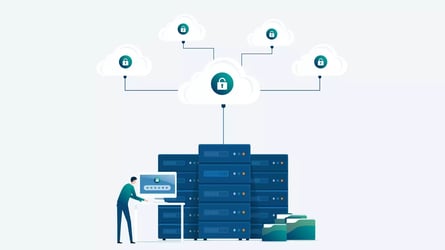According to recent data, the average company’s use of SaaS has grown to over 137 apps, and their typical user uses nine. And that growth trend is not slowing down. And that growth trend is not slowing down. What’s also growing are the number of risks and threats to the data stored in SaaS, which has also become more critical to business operations.
Unfortunately, there are huge vulnerabilities to critical SaaS data from provider outages and insufficient daily backups and recovery measures. Cyber attacks amount to 34% of data loss via AttackLoops, phishing emails that lead to costly downtime. However, the biggest risk to SaaS data is human error – 33% of SaaS data loss is due to accidental (and sometimes malicious) deletions by team members.
While there are comprehensive recovery solutions and cloud backup services out there designed to provide enhanced security measures, it’s also important to clearly understand the company's specific needs: what is SaaS backup, and why is it so essential to a comprehensive backup strategy?
What is SaaS Backup (and Recovery)?
Many companies operate today on a cloud-first approach when it comes to applications, using SaaS solutions for everything from CRM systems to software development. That’s why it’s vital to understand where the SaaS platforms being utilized fall short and the need to implement backup and recovery solutions for their business-critical data in public clouds.
SaaS cloud backup services are specifically designed with business continuity in mind, providing solutions to the current security gaps in today’s most popular cloud platforms to prevent costly downtime. They cover all bases, offering security solutions for even today’s most sophisticated cyberattacks and other threats to cloud-based data.
How Does SaaS Backup Work?
When businesses enlist the services of a third-party service to provide SaaS backup solutions, they provide software that can be integrated with their cloud platforms. The most common SaaS backup services include:
Data Encryption and Authentication Methods
SaaS backup and recovery solutions utilize the leading data encryption methods to safeguard all data that exists on the cloud. Transport layer security (TLS) is often implemented to protect data in transit, as well as other solutions safeguarding at rest data. Solutions like AES 265-bit data encryption are often deployed to provide the best layer of security and also meet today’s compliance standards.
SaaS data backup software also includes authentication features that restrict access to only those of the highest level such as Asigra’s SaaSAssure℠ backup solutions, which include both Multifactor Authentication and Multiperson Approval methods for accessing backed-up data crucial information like financial records, customer information, and more.
Cloud-Based or On-Premise Data Storage
Many SaaS backups will offer DevOps and managed service providers cutting-edge, secure cloud storage solutions that support public, private, and hybrid SaaS environments. The best options for a backup strategy will provide customers with storage flexibility, allowing them to choose the location or cloud storage vendor so that backup admins can meet data residency compliance and recovery performance requirements. Advanced services will allow the export of backed up SaaS data to their customer’s on-premise storage in a secure manner.
Data Tracking, Monitoring and Auditing
Although the majority of today’s most popular SaaS platforms do provide a minimum level of security when it comes to login and monitoring, it still doesn’t address the difficulty of monitoring data in real-time, unlike SaaS backup and recovery solutions. Many enterprises have very specific regulations and standards when it comes to protecting their own privacy, as well as that of their clients and SaaS backup/recovery can provide this.
In addition to monitoring, identifying (auditing) the most important data and making certain they know precisely where it is at all times is essential to prevent accidental deletions and other issues. By mapping data and tagging it when it’s in transit, in use, and at rest is one of the primary ways a third party can help keep track of all important assets. The challenge is greater if there are multiple SaaS backup point solutions for different SaaS services.
A good best practice is to find a SaaS backup solution from a single console that enables backup and recovery for the largest number of SaaS services that are most critical to business operations.
Data Recovery and Restoration
Arguably, one of the most important aspects of data protection in the cloud is what to do in a worst-case scenario. This is where having a comprehensive data recovery and restoration solution in place is a must. If cloud data has been compromised internally by accidental or malicious deletions from staff members or externally from ransomware, or other cyberattacks, restoring it to its original state as soon as possible is crucial to prevent data loss or leaks.
Who Needs SaaS Backup Services?
SaaS backup services benefit companies of all sizes and customer focus, providing the security solutions needed to maintain project timelines and drastically reduce or eliminate storage and security issues.
Some of the more critical SaaS data types that absolutely need to be part of a comprehensive backup strategy are:
- eCommerce SaaS solutions
- CRM platforms
- ERP software
- Hybrid communication, productivity, and collaborative platforms
- Development management tools
- Financial management platforms
5 Benefits of SaaS Data Backup
- Protecting Against Data Loss: One of the primary benefits offered by SaaS backup providers is protection against data loss. This includes everything from malware/ransomware infections and corrupted data to technical issues that make important data irretrievable.
- Remaining in Compliance: Most industries need to maintain strict compliance regulations when using cloud-based platforms, and SaaS data backup will ensure they are met. SaaS security and backup services provide retention policies that can easily be customized per industry requirements.
- Ensuring Business Continuity: Time is money, and when daily business draws to a halt due to a data breach or other issue on the cloud, resolving it as quickly as possible is an absolute must. In some cases, if the right solutions aren’t in place it can cripple a business’s reputation, in addition to taking months or even years to recover lost data. This can all be avoided with the right solutions to back up SaaS data.
- Backup Automation: There’s no need to spend costly time and human resources manually backing up data, SaaS backup providers can easily automate such a process, making daily workflow and project timelines more efficient.
- Scalability: For businesses planning for future growth, SaaS backup and recovery solutions are scalable and designed to meet any needs while the company expands. Having this type of flexibility and scalability when it comes to recovery and backup solutions is fundamental.
Final Thoughts
With the continued rapid adoption of SaaS cloud-based software, security solutions are becoming ever more complex, but so are ways to compromise such systems. As the industry expands, cyber attackers are implementing new ways to circumvent cloud security services, and remaining vigilant when it comes to data backup, storage, and recovery is critical to every organization’s continued success.







